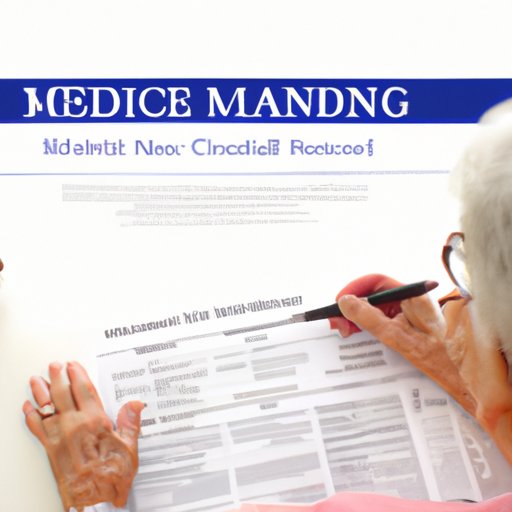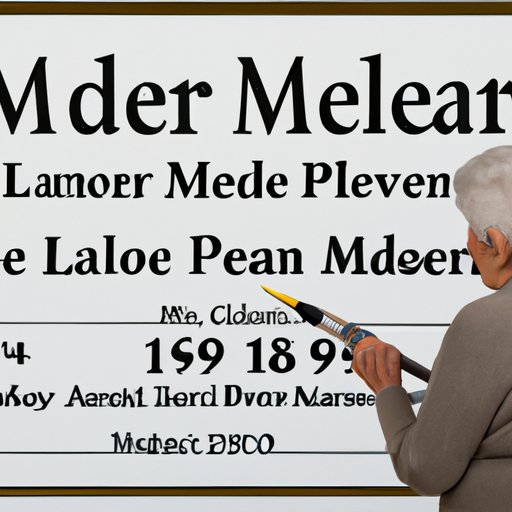Introduction
Turning 65 is a major milestone in life, as it marks the time when individuals become eligible to enroll in Medicare. But do you have to go on Medicare at age 65? This article seeks to answer this question by exploring the basics of Medicare eligibility, outlining the benefits and costs associated with enrolling in Medicare, highlighting the differences between Medicare and private insurance, examining the financial implications of enrolling in Medicare at 65, discussing the timeline for signing up, examining how Medicare coverage differs from state to state, and examining the impact of delaying enrollment in Medicare past age 65.

Explaining the Basics of Medicare Eligibility at Age 65
Medicare is a federal health insurance program run by the Centers for Medicare & Medicaid Services (CMS) that provides health care coverage to people over the age of 65, as well as certain younger individuals with disabilities. In order to be eligible for Medicare benefits, individuals must meet certain requirements, including being a U.S. citizen or permanent resident and having worked and paid into the Social Security system for 10 years or more.
Outlining the Benefits and Costs of Medicare for Those Turning 65
Medicare provides a range of health care services and benefits, including hospital care, doctor visits, preventive care, prescription drug coverage, lab tests, and durable medical equipment. The cost of these services can vary depending on the type of coverage an individual has. Medicare has four parts – A, B, C, and D – each of which covers different services. Part A covers hospital stays, Part B covers doctor visits and preventive care, Part C (also known as Medicare Advantage) offers additional benefits such as vision and dental coverage, and Part D covers prescription drugs.
In addition to the cost of the services themselves, there are also premiums that must be paid for Medicare coverage. These premiums can vary depending on the type of coverage an individual has and their income level. For example, individuals with higher incomes may pay higher premiums for Parts B and D than those with lower incomes.
Highlighting the Differences Between Medicare and Private Insurance
Medicare and private insurance provide different levels of coverage and cost, so it’s important to understand the differences between them. Private insurance typically covers a wider range of services than Medicare, but it also tends to be more expensive. Private insurance plans also often require copays and deductibles, whereas Medicare does not.
When comparing the costs of Medicare and private insurance, it’s important to consider both the premiums and out-of-pocket costs. While private insurance may have lower premiums, it may have higher out-of-pocket costs, such as copays and deductibles. Additionally, some private insurance plans may have annual or lifetime limits on coverage, while Medicare does not.

Examining the Financial Implications of Enrolling in Medicare at Age 65
Enrolling in Medicare at age 65 can have a significant impact on a person’s retirement income. Medicare premiums, copays, and deductibles can add up quickly, and many seniors on fixed incomes may find themselves struggling to make ends meet. Additionally, enrolling in Medicare may trigger a tax liability if an individual has income above certain thresholds.
It’s important to understand how Medicare will affect your retirement income before enrolling. If possible, individuals should try to save money throughout their working years to help cover the cost of Medicare premiums, copays, and deductibles. Additionally, speaking with a financial advisor can help individuals understand the potential tax implications of enrolling in Medicare.

Discussing the Timeline for Signing Up for Medicare at Age 65
The timeline for signing up for Medicare depends on when an individual turns 65. If an individual turns 65 during the three months before, during, or after their birthday month, they can sign up for Medicare during what is known as the Initial Enrollment Period. During this period, individuals can sign up for Medicare Parts A, B, C, and D. If an individual does not sign up during the Initial Enrollment Period, they can still sign up during the General Enrollment Period, which runs from January 1st to March 31st of each year.
Individuals can sign up for Medicare online through the CMS website, or they can call the Social Security Administration at 1-800-772-1213 to enroll. Additionally, individuals can work with a local State Health Insurance Assistance Program (SHIP) to get help with the enrollment process.
Examining How Medicare Coverage Differs From State to State
Medicare coverage can vary from state to state. For example, some states may offer additional benefits such as dental or vision coverage, while others may offer coverage for home health services. Additionally, some states may have different copayment or deductible amounts for certain services.
It’s important to research the Medicare coverage available in your state before enrolling. Contacting a local SHIP can help individuals understand the coverage options available in their state.

Examining the Impact of Delaying Enrollment in Medicare Past Age 65
Delaying enrollment in Medicare past age 65 can have serious consequences. Individuals who delay enrollment may face late enrollment penalties, which can add up quickly over time. Additionally, individuals who delay enrollment may find that their health care provider will not accept Medicare payments for services provided prior to the date of enrollment.
It’s important to understand the risks of delaying enrollment in Medicare before making a decision. Individuals should contact a local SHIP for more information about the potential penalties and other considerations associated with delaying enrollment.
Conclusion
Enrolling in Medicare at age 65 is an important decision that can have long-term financial implications. It’s important to understand the basics of Medicare eligibility, the benefits and costs associated with enrolling in Medicare, the differences between Medicare and private insurance, the financial implications of enrolling in Medicare at 65, the timeline for signing up, how Medicare coverage varies from state to state, and the impact of delaying enrollment in Medicare past age 65. With the right information, individuals can make informed decisions about whether or not to enroll in Medicare at age 65.
Resources:
Centers for Medicare & Medicaid Services: https://www.cms.gov/
Social Security Administration: https://www.ssa.gov/
State Health Insurance Assistance Programs: https://www.shiptacenter.
(Note: Is this article not meeting your expectations? Do you have knowledge or insights to share? Unlock new opportunities and expand your reach by joining our authors team. Click Registration to join us and share your expertise with our readers.)
